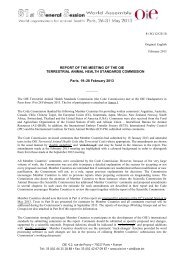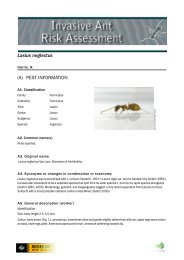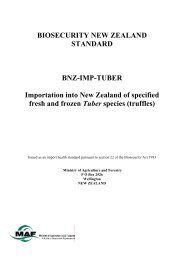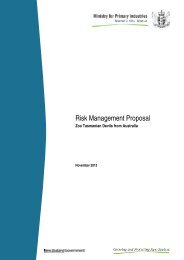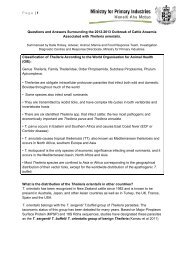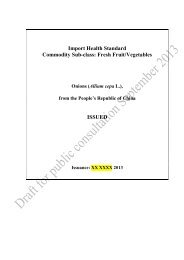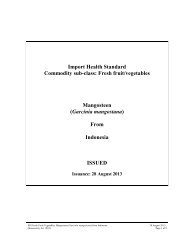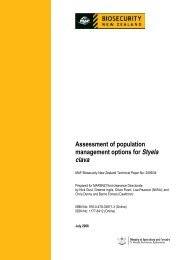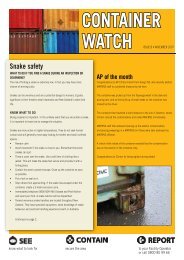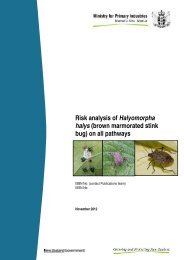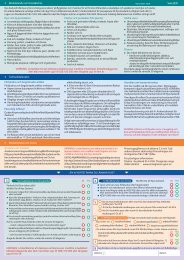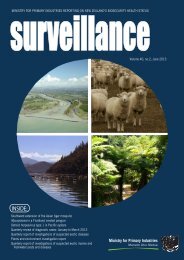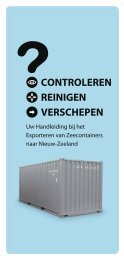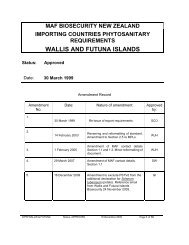Import risk analysis: Llamas (Lama glama) and alpacas (Vicugna ...
Import risk analysis: Llamas (Lama glama) and alpacas (Vicugna ...
Import risk analysis: Llamas (Lama glama) and alpacas (Vicugna ...
Create successful ePaper yourself
Turn your PDF publications into a flip-book with our unique Google optimized e-Paper software.
38. Weeds <strong>and</strong> seeds<br />
38.1. HAZARD IDENTIFICATION<br />
38.1.1. Aetiological agent<br />
All plant material including seeds.<br />
38.1.2. OIE list<br />
Not listed.<br />
38.1.3. New Zeal<strong>and</strong> status<br />
Organisms of concern are exotic plants <strong>and</strong> seeds.<br />
38.1.4. General considerations<br />
Weeds <strong>and</strong> seeds could be found attached to the fibre <strong>and</strong> hair of camelids. Large seed<br />
heads <strong>and</strong> pieces of plant material would be easily visible <strong>and</strong> could be removed before<br />
shipment but small seeds would be difficult to detect.<br />
Seeds are specifically adapted to survive unfavourable environmental conditions <strong>and</strong> most<br />
will at least survive from one growing season to another. Many will survive for several<br />
years <strong>and</strong> germinate when favourable conditions occur. Most seeds are highly resistant to<br />
dehydration, particularly those from plants adapted to survival in desert or hot dry climates<br />
<strong>and</strong> most seeds retain viability better in dry conditions but some are specifically adapted to<br />
remain viable in water. Mimosa glomerata seeds survived 221 years in the herbarium of<br />
the Museum National d’Histoire Naturelle in Paris. Lupinus arcticus seeds frozen in a<br />
lemming’s burrow that was dated as 10,000 years old germinated within 48 hours when<br />
placed in favourable conditions (Encyclopædia Britannica 2008). Some seeds are adapted<br />
to environments subjected to periodic fires <strong>and</strong> survive or are activated by fires. Others are<br />
adapted to be dispersed by water including those that are adapted to salt water.<br />
Weed seeds can survive passage through an animal’s digestive system <strong>and</strong> be passed out in<br />
faeces (Katovich et al undated). A review of passage times for weed seeds in the digestive<br />
tract of herbivores (Barton <strong>and</strong> Williams 2001) concluded that, to avoid the importation of<br />
most unwanted seeds in the digestive tracts of herbivorous animals destined for New<br />
Zeal<strong>and</strong>, they should be fed a seed-free diet for at least 10 days prior to their arrival in New<br />
Zeal<strong>and</strong>. Cattle passed about half the seeds ingested by 2.5 days <strong>and</strong> most of them by 7<br />
days. A few seeds were retained for up to 1 month in cattle. It is expected that passage<br />
times for weed seeds in the digestive tracts of camelids would not be longer than those for<br />
cattle. The wide variation around the mean seed-passage times was attributed to many<br />
factors such as individual animal effects, whether or not the animal was pregnant, <strong>and</strong> food<br />
intake. The most widely reported factor with potential applicability to quarantine protocol<br />
was faster seed-passage time in animals fed a high-quality diet.<br />
An import <strong>risk</strong> <strong>analysis</strong> of the importation of weed species by live animals recommended<br />
that animals should be held, pre-shipment, in areas free of weed species <strong>and</strong> fed on clean<br />
pasture or high quality feed (MAF 1999). During transport, provision of high quality feed<br />
with little or no weed species contamination, or feed that has been treated in such a way as<br />
to render seeds non-viable, would mitigate the <strong>risk</strong>s associated with the importation of live<br />
MAF Biosecurity New Zeal<strong>and</strong> <strong>Import</strong> <strong>risk</strong> <strong>analysis</strong>: <strong>Llamas</strong> <strong>and</strong> <strong>alpacas</strong> from specified countries ● 149



